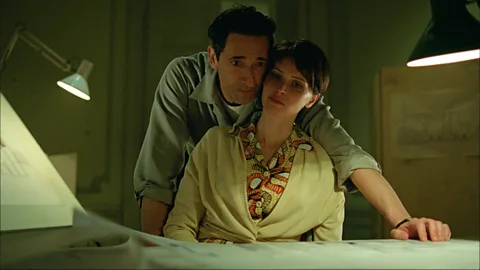 Searchlight Pictures/ Amazon Content Services/ Paramount Pictures/ Mubi/ BBC
Searchlight Pictures/ Amazon Content Services/ Paramount Pictures/ Mubi/ BBCThese are the films generating the most excitement ahead of awards season, from Demi Moore’s body-horror comeback to the return of Ridley Scott’s swords-and-sandals epic.
 Focus Features
Focus FeaturesConclave
Its potboiler plot doesn’t sound like awards bait on paper, but Conclave hits the Oscar sweet spot: it plays like a compelling commercial thriller but has plenty of artistic cred. The fictional story goes behind the scenes as cardinals scheme and play politics to elect a new pope. That story is elevated by Edward Berger’s meticulous direction, every shot full of visual artistry and information, and by Ralph Fiennes’s subtly powerful performance as the cardinal in charge of the conclave while doubting his own faith. Well received by critics and audiences, it’s a sure thing for a best picture nomination, with Fiennes very likely getting a best actor nod, Berger a strong possibility as director and maybe Stanley Tucci as supporting actor. Twice nominated, Fiennes has never won, and has “he’s overdue” going for him. Voters obviously like Berger, whose All Quiet on the Western Front (2022) won four Oscars, including best international film. Conclave’s biggest obstacle: keeping up its early momentum. (CJ)
Nickel Boys
Nickel Boys is adapted from a Pulitzer prize-winning novel by Colson Whitehead, which was drawn in turn from reports of the horrific racist abuse that took place in a Florida reform school in the 1960s. It’s just the kind of heavyweight, politically charged period drama that would appeal to the Academy, however it was made. But the film’s innovative camerawork is what really sets Nickel Boys apart. RaMell Ross, the maker of a 2018 Oscar-nominated documentary, Hale County This Morning, This Evening, shows everything from the viewpoint of the main characters. The audience seems to be looking through the eyes of two teenage boys (Ethan Herisse and Brandon Wilson), an immersive technique that is common in video games and virtual reality experiences, but so unusual in a film that Nickel Boys is the obvious pick for this year’s cinematography and editing prizes, at the very least. (NB)
 Pathé Films
Pathé FilmsEmilia Pérez
There’s not a more audacious, wonderfully bonkers or engaging film out there than this singing, dancing drama about a transgender Mexican crime lord who fakes her death and hides her new identity from her wife and children. Accessible and unique, this vibrant film, full of criminal action and personal emotion, is a frontrunner to win best international film, and a strong contender for a best picture nod. It will certainly figure in acting categories. Karla Sofía Gascón, who plays Emilia, is very likely for best actress, and would be the first trans nominee in that category. Zoe Saldaña, who has one of the best dance scenes, stands a good chance as supporting actress for her poignant performance as Emilia’s lawyer. One good omen: at the Cannes Film Festival, they shared the best actress prize with co-stars Selena Gomez and Adriana Paz. If Netflix campaigns well enough, director Jacques Audiard might even make it into best director. (CJ)
Gladiator II
Even before its colourful, action-filled trailer dropped, audiences were excited about this sequel to the 2000 sword-and-sandals epic that won best picture. That anticipation was built partly on its dream-team casting: Paul Mescal as Lucius, the revenge-fuelled son of Russell Crowe’s character in the original, Pedro Pascal as a Roman general, and Denzel Washington as a wealthy owner of gladiators. The trailer set off instant speculation that Washington is a likely supporting actor nominee, if only for his fierce, scenery-chewing proclamation, “I must have POWER.” The film’s spectacle and scale make it a natural in technical areas, including production design. And it’s likely to be nominated for best picture, a category with up to 10 titles. But with only five slots for director, what happens to Sir Ridley Scott? In a career that includes Alien, Blade Runner and the first Gladiator, he has been nominated as director three times but never won. He has a good chance of making the cut, in a race that should be especially intriguing to follow. (CJ)
 A24
A24The Brutalist
Most film journalists assumed that this year’s most impressive drama about a visionary architect would be Francis Ford Coppola’s Megalopolis. But then Brady Corbet’s The Brutalist came along. This indie period epic cost less than £10m ($13m) to make – ie, well under one-tenth of Megalopolis’s budget – but it runs for 215 minutes, including an interval, and its themes, ideas and ambitions are sky-scrapingly expansive. Adrien Brody stars as a Hungarian-Jewish architect who migrates to the US just after World War Two, and is hired to build a vast concrete cultural centre for a tycoon played by Guy Pearce. It’s Brody’s most compelling performance since he won an Oscar for The Pianist back in 2003, so there would be a certain symmetry if he took home a second Oscar for a not dissimilar role, 22 years on. Meanwhile, Corbet and his co-writer and partner Mona Fastvold are in the frame for a best screenplay award. And if Hollywood wants to reassure itself that films can be serious-minded, uncompromising and artistic, then a best picture nod isn’t out of the question. (NB)
Anora
Sean Baker follows such earthy indie favourites as The Florida Project and Red Rocket with his most crowd-pleasing film to date, a riotous farce about a strip-club dancer played by Mikey Madison who is whisked into a world of obscene wealth by a Russian oligarch’s son, played by Mark Eydelshteyn. It’s sparkily entertaining, which is not something you can say about every film that wins prestigious awards, but Anora is no escapist romcom. Not only is it rooted in the rough, tough reality of New York’s Russian-American community, it takes an unsparing look at the power imbalance between the super-rich and everyone else. Ever since it won the Palme d’Or at Cannes, it has been seen as a contender for best picture, best original screenplay and best director Oscars. And if Madison isn’t nominated for best actress, then the Academy might as well admit that it isn’t fit for purpose. (NB)
A Real Pain
Ever since this touching, funny, crowd-pleasing drama premiered at the Sundance Film Festival, Kieran Culkin has seemed like a lock for a supporting actor nomination as one of two cousins visiting their grandmother’s birthplace in Poland. Culkin deserves that buzz. In fact, he and Jesse Eisenberg, who also wrote and directed, are co-leads, but positioning Culkin as supporting increases his chance to win (as in, he won’t be competing against Adrien Brody and Ralph Fiennes in lead, although as it turns out he may face the prospect of Denzel). Each actor stays close to his typical role, with Culkin as the outgoing, irreverent cousin and Eisenberg as the nervous, buttoned-down guy, but they bring new depth to those types. With its deftly blended themes – the cousins’ Jewish heritage and the Holocaust, as well as family dynamics and personal, emotional pain – the film should also be competitive in best picture and original screenplay. It’s a bit surprising that the film isn’t seen as stronger in those categories too, but now that it has opened that muted buzz might grow. (CJ)
 Iglesias Más
Iglesias MásThe Room Next Door
Pedro Almodóvar’s The Room Next Door won the top prize at this year’s Venice Film Festival, and given that other recent recipients include Poor Things, Joker, Nomadland and The Shape of Water, that means that it must be in line for more big prizes in the months to come. Most critics agree that it isn’t Almodóvar’s finest work, but it’s the Spanish writer-director’s first feature film in English, and it’s sincere and elegant in its treatment of a knotty theme: the right of a terminally ill person to end their own life. Tilda Swinton plays a retired war correspondent with cancer, and Julianne Moore plays an old friend of hers, an author who agrees to stay with her in a rented country house as death approaches. The film is close to being a two-hander, so the tricky part is: will the studio put both women in the lead actress category? Or will it pretend that Moore is a supporting actress, so as not to risk splitting the vote between them? (NB)
The Substance
Like Emerald Fennell’s Promising Young Woman and Saltburn, The Substance is a high-concept satire that is hardly subtle, but which is brash and bloody enough to get people into cinemas – and to get them talking on the way out – so its writer-director, Coralie Fargeat, could nab an Oscar nomination for best original screenplay. Its lead actress, Demi Moore, should be in the mix this awards season, too. She plays a former superstar who is tossed aside by the sexist and ageist entertainment industry, and resorts to creating a younger clone of herself (Margaret Qualley). It’s a bravely self-parodying role, and Moore attacks it with such gusto that this could be one of those John-Travolta-in-Pulp-Fiction situations which remind Academy voters how much they once valued an actor who has fallen out of fashion. Another factor is that Hollywood is oddly fond of films that mock Hollywood, so The Substance could even be a best picture nominee. (NB)
 Searchlight Pictures
Searchlight PicturesA Complete Unknown
Oscar voters can’t resist a biopic. And so, sight unseen by critics or audiences, this fictionalised version of Bob Dylan at the start his career is already in the mix. Part of that is due to its lead actor, Timothée Chalamet as Dylan in his Greenwich Village years. Some of it comes from a template that might as well be a build-an-Oscar-nomination blueprint: get famous actors to play famous real-life singers, and let them do the singing themselves. Consider this: A Complete Unknown was directed by James Mangold, who directed another awards-bait musical biopic, Walk the Line (2005). Reese Witherspoon won the best actress Oscar for her performance in that film as June Carter Cash and Joaquin Phoenix earned a best actor nomination as Johnny Cash. If nothing else, A Complete Unknown may well bring Chalamet his second nomination, after Call Me By Your Name (2017). (CJ)

